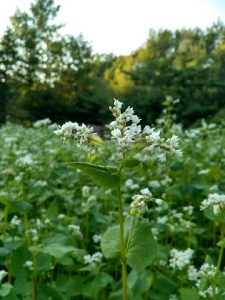Assessing the Climate Mitigation Potential of Maine Agriculture
 Institution: University of Maine
Institution: University of Maine
Sponsor: Senator George J. Mitchell Center for Sustainability Solutions
A Maine soil health initiative to enhance agricultural sustainability and mitigate climate change
Farming practices that promote “soil health” can make farms more productive, profitable, and resilient to climate change impacts. Additionally, some soil health building practices—for example, cover cropping, reducing tillage, and biochar application—can contribute to greenhouse gas mitigation. There is growing interest in state and regional policies to incentivize soil health building practices, but to inform these policy efforts, a baseline assessment is needed.
This project seeks to provide such an assessment by partnering with stakeholders to: determine the extent to which Maine farmers are currently utilizing soil health building practices; study the economics of these practices and identify barriers to wider adoption; estimate how much greenhouse gas could be mitigated and farm productivity improved by these practices; and, identify additional ecosystem services that could also be enhanced through improved soil health. Project results will provide farmers and policymakers with a systematic way to evaluate and prioritize soil health building practices based on their economic, agricultural, and environmental performance.
Key community partners in this work include the American Farmland Trust, Maine Farmland Trust, and Maine Climate Table, all of whom are actively engaged in promoting practices that build soil health and contribute to climate change mitigation. This project leverages existing networks and the expertise of our interdisciplinary research team to identify solutions to improve soil health, support ecosystem services, and enhance climate adaptation and mitigation in Maine’s agricultural sector.
Project Update (July 2020)
The project team identified current rates of use and types of practices to promote soil health and climate change mitigation in Maine. They also identified incentives and barriers for farmers to implement a range of agricultural and conservation practices in farmland across Maine, including those related to promoting soil health.
The research serves as the foundation to quantify the potential for greenhouse gas (GHG) emission reductions and carbon sequestration, improved water quality and quantity, increased yields and profits per acre, and enhanced climate change resiliency (i.e., adaptation) through increased rates of adoption of these practices. In addition, the study provides a blueprint for efforts to establish policies and programs at both the state and regional level to incentivize practices promoting soil health within the agricultural sector.
The detailed analysis produced by the team has been disseminated widely through a number of presentations, webinars, and meetings with stakeholders including the Maine Climate Table and Maine Farmland Trust. Preliminary results have been featured in the Maine Climate Council’s Natural and Working Lands Working Group’s recommendations for greenhouse gas reduction and climate change adaptation strategies. It is anticipated that revised results of the analysis will be used to inform Maine’s Climate Action Plan, which is due at the end of 2020. Furthermore, findings from are expected to influence policy making after the Climate Action Plan is released.
A limitation of this study has been the inability to complete as many focus groups as intended due to the Covid-19 pandemic. The team is committed to conducting the remaining focus groups in fall 2020 after the farming season has ended.
Maine Climate Table Webinars
Tuesday, May 12, 2020 noon-1 PM
Putting a price-tag on Natural Climate Solutions
Dr. Adam Daigneault, E.L. Giddings Assistant Professor of Forest, Conservation, and Recreation Policy, University of Maine
Monday, June 29, 2020 noon-1 PM
PART 2: Putting a price-tag on Natural Climate Solutions: Forestry
Dr. Adam Daigneault, E.L. Giddings Assistant Professor of Forest, Conservation, and Recreation Policy, University of Maine
Team Information
Team Leader:
- Adam Daigneault, Assistant Professor, School of Forest Resources & Mitchell Center, UMaine
Team Members:
- Ivan Fernandez, Distinguished Professor, Climate Change Institute & School of Forest Resources, UMaine
- Cindy Isenhour, Associate Professor, Department of Anthropology & Mitchell Center, UMaine
- Sonja Birthisel, Post-Doctoral Research Associate, School of Forest Resources, UMaine
Partners:
